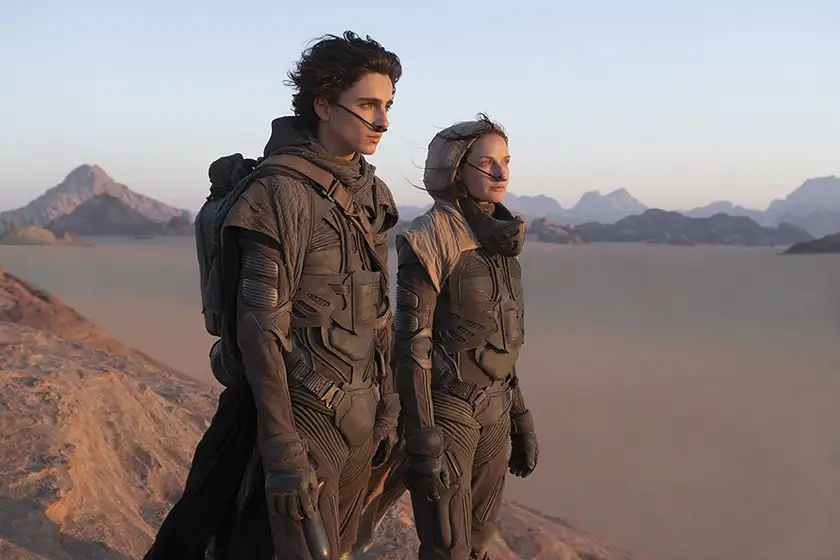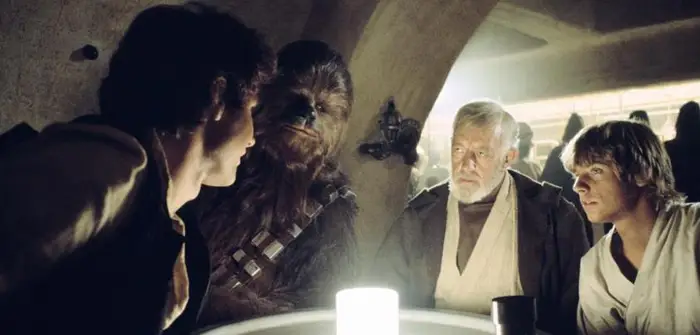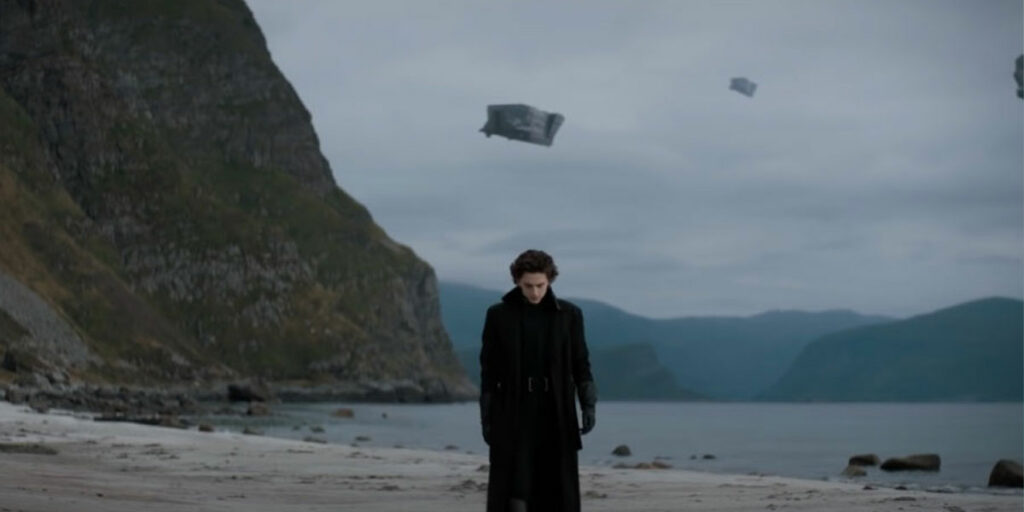Denis Villeneuve’s Dune continues a trend of self-serious space operas. In its descent into darkness, has science fiction forgotten how to have fun?
Dune is a remarkable achievement. A mega-budget, star-studded adaptation of a novel that thwarted filmmaking giants such as Alejandro Jodorowsky, Ridley Scott and David Lynch, its ambition is surpassed in scale only by the iconic sandworms that dominate the screen every time they pop up to snack on some Hollywood A-listers. Throughout its 155-minute runtime, Denis Villeneuve’s film is a complete explosion of the senses, a thunderous journey through the universe first conceived by novelist Frank Herbert over 60 years ago. It’s also very silly.
Like all great science fiction, Dune is replete with eccentric outfits, peculiar creatures and preposterous names. There’s a mind-altering substance called spice, an ominous shadowy cult by the name of the Bene Gesserit, and characters called Gurney Halleck, Vladimir Harkonnen, Glossu Rabban and, well, Paul. In theory, there’s plenty to relish for fans of the absurd, campy conventions of sci-fi cinema, as well as those looking for the high-octane thrills promised by the film’s gargantuan budget. Why, then, does Dune feel so joyless?
Villeneuve’s film is far from the first self-serious space opera to hit the big screen, but it may just be the ne plus ultra of a decades-long trend. Sci-fi and fantasy have been getting darker, both thematically and aesthetically, for many years. Some would argue that this is a sign of the genre maturing; Dune is, after all, a film whose otherworldly concepts veil thinly a critique of issues much closer to home. Its warring families recall the European empires of old, while the Fremen and the spice extracted from their home planet of Arrakis stand in for the native peoples of developing countries whose lands were plundered by colonisers for profit.
The stakes are high and the motives go beyond the simple binary of good versus evil – this story isn’t so much about heroes and villains as it is about the complicated, ugly truths that perpetuate injustice and conflict in our own world. Villeneuve’s film is therefore dark, serious and terribly po-faced, its dry dialogue and brooding performers matched by cinematographer Greig Fraser’s aversion to any colour brighter than a murky desert beige.

This would all be fine if it weren’t for the existence of another much more joyful sci-fi epic about a young man destined for greatness, living on a desert planet whose inhabitants are subject to imperial tyrants. Star Wars owes quite a debt to Frank Herbert’s original novel, treading a fine line between homage and rip-off, depending on who you ask. But if there’s one thing I can say with certainty that George Lucas brought to the table himself, it’s a sense of playfulness.
Like most major sci-fi franchises, Star Wars has also ‘joined the dark side’ over the years (see Rogue One: A Star Wars Story or the more recent Andor TV series), so it’s easy to forget just what an adventurous romp the original 1977 movie is. There’s plenty of gloom courtesy of Darth Vader and his evil imperial army – we even witness the genocide of an entire planet halfway through the film – but for every act of violence and oppression there’s the interplay between R2-D2 (Kenny Baker) and C-3PO (Anthony Daniels), the twinkle-eyed charisma of Han Solo (Harrison Ford), and the carnivalesque atmosphere of the famous cantina scene. It also boasts a lush colour palette, groundbreaking technical imagery and that stirring John Williams score. The galaxy far, far away may be full of darkness and danger, but it’s never dull.
It’s worth noting that the target audiences of these two films are quite different, and the sophisticated themes of Dune seem designed to reject the romanticism of epic fiction. However, I would argue that regardless of the complexity of its ideas, any film that expects me to take a swashbuckling space swordsman called ‘Duncan Idaho’ seriously needs to lighten up a little. No matter how sombre the tone of sci-fi cinema has become over the decades, it still feels absurd to approach a film like this with all the earnestness of a first reading of “The Bell Jar.”
For those unconvinced, I’ll proffer an alternative reason for the 21st century space opera to embrace its silly side: these idiosyncrasies are vital in fleshing out the universes to which they belong. It seems we can’t have a single conversation about sci-fi or fantasy without encountering the term ‘worldbuilding’, the intricate construction of a fictional universe, with all its locations, histories and rules. From Game of Thrones and Doctor Who to countless Star Wars instalments, nowadays worldbuilding seems to be half the battle for screenwriters working on any mainstream sci-fi or fantasy franchise.
In the age of digital culture, this stuff is increasingly important to a story’s perceived integrity, with fans of source material and previous editions of a given saga ready to pounce on the first inaccuracy or inconsistency they lay eyes on. But increasingly it feels like filmmakers can’t see the woods for the trees; by focusing so incessantly on geography, historiography and other such minutiae, they forget to account for the less obvious, less tangible elements that bring a world to life.
The quirks and idiosyncrasies that make up such media are more than a reprieve from the darkness of their narratives – they contribute scale and gravitas, and allow audiences to fully immerse themselves in new cinematic worlds. It’s through the Star Wars cantina scene, or the various oddball customs of the hobbits in The Lord of the Rings, where we get a sense of the society and culture at stake in their respective stories, that we learn unconsciously to identify with the characters in spite of their alienness to us. With every gross-out habit or quirky turn of phrase, the world our heroes belong to feels a little bigger and more complex. I believe that this is what is missing from Dune – aside from the rabble of unidentifiable Fremen we occasionally see on screen, how do we know that the events depicted impact anyone other than Timothée Chalamet’s Paul and his aristocratic family? When its weirdness is dialled down in favour of bland self-seriousness and obsessive exposition, the vast universe of Dune feels paradoxically small.

Villeneuve’s earlier forays into sci-fi share much of the darkness of Dune, but they don’t ask us to invest in a world as alien to us as Arrakis. The magnificent Arrival only flirts with the epic, its spacecraft and aliens setting the stage for a truly human story set on a contemporary Earth. Blade Runner 2049 is a little further from reality, but its depiction of a future Los Angeles is identifiable as something resembling human civilisation and the questions it raises, extending those in Ridley Scott’s 1982 film, speak to fundamental human experiences. There is less buy-in required when the world in which a story takes place is one its audience can recognise. But when we are plunged into the politics and conflicts of Dune, with little understanding of what is at stake and why we should care, all the portentous line delivery and CGI monsters in the world can’t stop the film from feeling frustratingly hollow.
Unfortunately, contemporary cinema offers little in the way of an alternative to the sober tone of Dune, and I certainly prefer Villeneuve’s sincerity to the self-aware irony of recent Marvel Studios efforts. The overly self-effacing jokes of films like Spider-Man: No Way Home or Thor: Love and Thunder feel like an overcorrection, the filmmakers mistaking smug cynicism for humour. It is only Guardians of the Galaxy and its sequels that come close to recapturing the spirit of the space operas of the 1970s and ‘80s, mitigating the darkness and portent by embracing the absurdity of its characters and the universe they inhabit. Even if their final acts are forced to follow the usual Marvel formula, these films prove that we can still tell epic stories without losing sight of what an extravagant, distinctive space adventure is supposed to look and feel like.
If you look closely, there are hints of the kind of levity I’m pining for sprinkled throughout Dune like grains of Arrakis sand. The Atreides family’s ceremonial bagpiper offers a delicious dose of the ridiculous, while Stellan Skarsgård is having lots of fun as the gruesome, Machiavellian Baron Harkonnen. With Skarsgård being joined by the likes of Austin Butler, who burst onto the scene in the zany Elvis, 007’s Léa Seydoux and the effervescent Christopher Walken, the stars of Dune: Part Two are no strangers to the weird and wonderful. I’m hardly expecting a musical number, but if we are going to sit through another three hours of dour interplanetary conflict, would it hurt for us to have a little fun along the way?
Denis Villeneuve’s Dune: Part Two will be released globally in theaters on March 15, 2024.

